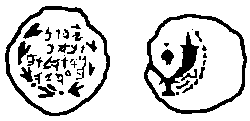Coins of Alexander Jannaeus
- Coins of Alexander Jannaeus
-
Alexander Jannaeus was a Hasmonean ruler, and also the third Hasmonean to mint coins, preceded by Hyrcanus I and Aristobulus[1]. Jannaeus minted the largest and most broadest selection of Hasmonean Coinage[2].

A typical Hendin 474 coin,
reading:
YHON
TNHK
NHGDLVH
VRHYD[
M]
Types of Coinage
Jannaeus minted half-prutot and whole prutot. The main type of prutah minted by Jananeus was similar to that of Aristobulus and Hyrcanus I, having text meaning "Yehonatan (or Yonatan) the High Priest and the council of the Jews in a wreath, and on the obverse having double cornucopiae meeting at base, pomegranate between, ribbons around. Some other coins of Jannaeus are the lily/anchor prutah, with an anchor and a diadem on one side with Greek around, meaning "King Alexander", and on the reverse is a lily with ancient Hebrew around meaning "The king Yehonatan", the palm/lily prutah with a palm branch on the obverse with ancient Hebrew around meaning "The king Yehonatan" in a border of dots and a circle or square on the top, and a lily on the other side. A few more types are the anchor/star prutah with an anchor on one side, Greek around meaning "King Alexander, on the other side is an 8-pointed star in a diadem, between rays "The King Yehonatan" in ancient Hebrew. Jannaeus also minted a similar half prutah with a date on it.[3]
References
Wikimedia Foundation.
2010.
Look at other dictionaries:
Alexander Jannaeus — (also known as Alexander Jannai/Yannai), king of Judea from (103 BCE to 76 BCE), son of John Hyrcanus, inherited the throne from his brother Aristobulus, and appears to have married his brother s widow, Shlomtzion or Shelomit , also known as… … Wikipedia
YANNAI (Jannaeus), ALEXANDER — (b. c. 126–76 B.C.E.), Hasmonean ruler of Judaea (103–76 B.C.E.), son of John Hyrcanus; was high priest and king. According to Josephus, Yannai was hated by his father and for this reason was forced to spend his childhood in Galilee. When his… … Encyclopedia of Judaism
ARCHAEOLOGY — The term archaeology is derived from the Greek words archaios ( ancient ) and logos ( knowledge, discourse ) and was already used in ancient Greek literature in reference to the study of ancient times. In its modern sense it has come to mean the… … Encyclopedia of Judaism
Wicked Priest — ( he. הכהן הרשע; Romanized Hebrew: ha kōhēn hā rāš ā) is a sobriquet used in the Dead Sea scrolls pesharim , fourfn|α times in the Habakkuk Commentary (1QpHab) and once in the Commentary on Psalm 37 (4QpPsa), to refer to an opponent of the… … Wikipedia
Hashmonean coinage — are the coins minted by the Hasmonean Kings. Only bronze coins in various denominations have been found; the smallest being a prutah or a half prutah. Two Roman silver denarii s are associated with the Hashmoneans; one has the inscription BACCIUS … Wikipedia
Salome Alexandra — or Alexandra of Jerusalem (139 ndash;67 BCE), (Hebrew שלומציון Shelomtzion or ShlomTzion ) was the only Jewish regnant queen, with the exception of her own husband s mother whom he had prevented from ruling as his dying father had wished, and of… … Wikipedia
Palestine — /pal euh stuyn / for 1, 2; /pal euh steen / for 3, n. 1. Also called Holy Land. Biblical name, Canaan. an ancient country in SW Asia, on the E coast of the Mediterranean. 2. a former British mandate (1923 48) comprising part of this country,… … Universalium
Mite box — A bronze Widow s Mite or Lepton, minted by Alexander Jannaeus, King of Judaea, 103 76 B.C. obverse: anchor upside down in circle, reverse: star of eight rays. The term mite box (also alms box or poor box) refers to a box that is used to save… … Wikipedia
Judaea Coin Archive — Logo of the site The Judean Coin archives (also spelled as Judaean), is an online photo gallery archive of photos and information about ancient Jewish coinage, located at http://www.judaea.chimehost.net. The archive also has the only online… … Wikipedia
Judaism — /jooh dee iz euhm, day , deuh /, n. 1. the monotheistic religion of the Jews, having its ethical, ceremonial, and legal foundation in the precepts of the Old Testament and in the teachings and commentaries of the rabbis as found chiefly in the… … Universalium

